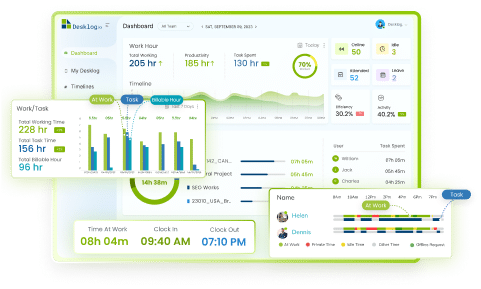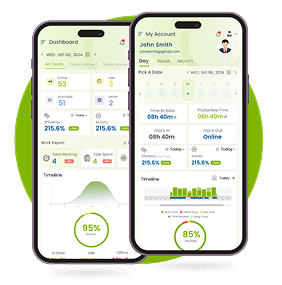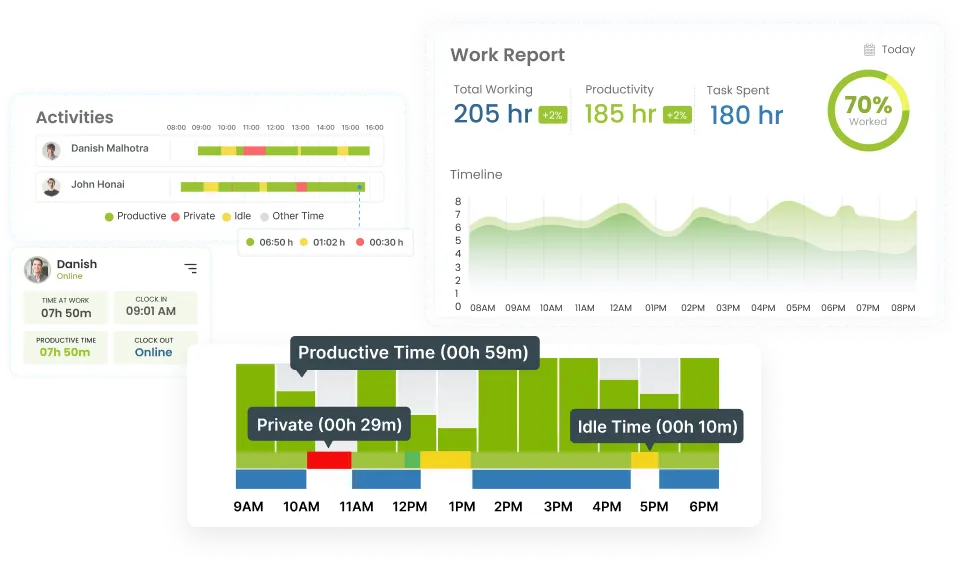Role of Time Tracking in Employee Performance Evaluation
In the world of business, evaluating employee performance is like a secret formula for success. It enables businesses to assess how well their teams are performing and identify opportunities for improvement. But today, this can be achieved effortlessly through employee time tracking.
Think of it as a special magic wand that reveals how time is spent at work and opens the door to the future of productivity. how productive and effective their employees are. Companies who have access to this powerful tool can make better judgments about how to examine and enhance performance. It’s like unlocking the secrets of success with a little time-tracking magic.
Let’s have a fascinating journey through the world of employee time tracking and its incredible impact on performance evaluation. So, Pack your luggage, grab your fancy passport, and board our mind-blowing flight! ✈️
And guess what? This thrilling ride will not cost you a single penny. Get ready for a wonderful voyage filled with laughs and more fun. 🙂
Understanding Employee Time Tracking
Employee time tracking is tracking and recording how much time employees spend at work. Organisations can acquire useful insights and statistics on how their employees allocate and manage their time by using it.
Let’s take a closer look at employee time tracking and how it affects performance evaluation.
The First employee time clock , known as the “Bundy Clock,” was invented by Willard L. Bundy in 1888. This mechanical time clock revolutionized time tracking in workplaces, allowing for more precise and efficient record-keeping of employees’ work hours.
Employee time tracking begins with employees manually documenting their working hours, either on paper or through computer systems. Modern time tracking software, on the other hand, includes more advanced and automatic features. These solutions use biometrics and GPS to track employee time more precisely.
Employee time tracking offers numerous benefits for both employees and organizations
According to a survey, approximately 82% of businesses in the United States use an automated time and attendance system for employee time tracking.
Employee time tracking is not merely a means to track employees; it is a valuable tool that empowers individuals and organizations to optimize productivity, improve time management, and enhance performance evaluations. By leveraging accurate and insightful time tracking data, organizations can foster a culture of transparency, productivity, and continuous improvement.
The Role of Employee Time Tracking in Performance Evaluation
Now coming to the context of this blog, How might time tracking help with employee performance evaluation? To begin, consider several case studies in which time tracking technologies improved employee performance.
Time Tracking and Employee Performance During the Pandemic

As the world grappled with the unprecedented challenges brought by the COVID-19 pandemic, organizations were forced to adapt to a new way of working. This sudden shift to remote work left managers wondering how to analyse performance evaluation and ensure that employees remained focused on their tasks.
The loss of visibility into employees’ daily activity was one of the key issues during remote employment. The organisations struggled to analyse performance due to a lack of comprehensive reports.
But with time tracking software, organizations were able to obtain valuable information about how their employees were spending their work hours. The accessible reports increased trust among employees, allowing them to observe their productivity trends and make required improvements.
There are many cases where employees started struggling with work-life balance during the pandemic. To address this issue, many companies introduced time tracking software, and the results considerably exceeded their expectations. Employees were able to assess their own performance and make required adjustments to increase productivity thanks to the real-time tracking of time and projects.
Moreover, time tracking helped these employees in setting distinct boundaries as it enabled them to accurately track their working hours. By having a clear understanding of their daily schedule, employees are empowered to prioritise responsibilities, reduce unnecessary overtime, and provide appropriate time for their personal well-being.
About 96% of companies use some kind of employee tracking software, according to a survey.
Keeping track of employee performance throughout the pandemic was difficult. However, our research has revealed that using a time tracking application has made the procedure extremely simple. This shows how important time tracking is to evaluate employee performance.
Now, let’s examine the mechanics of this transformation with the implementation of time tracking.
As said, employee time tracking plays a vital role in performance evaluations by providing objective and data-driven insights into employee productivity and performance. Here’s how it can be leveraged to enhance evaluations:
Time tracking data provides quantitative measurements of employee performance such as hours spent, task completion time, and meeting deadlines, which can be used to evaluate employee performance.
By identifying patterns of time waste or poor job allocation, time tracking allows managers to provide targeted feedback and support for improved time management skills..
Time tracking ensures that all employees are objectively evaluated rather than subjectively, providing for an equitable appraisal procedure.
According to a better understanding of their time management and productivity, Employees can utilise time tracking data to develop realistic goals for self-improvement.
Importance of Accurate Time Tracking Data in Evaluating Employee Performance
Accurate time tracking is essential for fair and objective performance evaluation. It is a proof of employees’ working hours, allowing businesses to assess their contributions, productivity, and punctuality. When performance evaluations are based on exact data, they become more transparent and honest, ensuring that employees are recognised and rewarded based on their actual performance.
Enhancing Productivity and Efficiency Through Time Tracking
According to a survey conducted by Harvard Business Review, the U.S. economy is losing 50 million hours, or $7.4 billion a day, in productivity.
Employees can use time tracking software to keep track of the time they spend on different tasks and projects. They have a better understanding of their production patterns and may make more knowledgeable decisions about job priority by visualising how time is allocated. This improved awareness leads to increased productivity and efficiency because individuals may focus on high-priority activities while reducing time waste.
Identifying and Addressing Time Management Issues
In a study conducted by RescueTime, it was found that employees spend an average 21% of working hours on entertainment, news, and social media.
Data from time tracking is like a diagnostic tool to detect time management issues.It detects inefficiencies, waste of time, and excessive multitasking. With this knowledge, employees and managers can work together to solve time management problems, optimise processes, and implement efficiency-boosting techniques.
The Impact of Time Tracking on Project Management and Meeting Deadlines
Time tracking is essential for project management and achieving deadlines. Managers gain visibility into progress and resource allocation by properly tracking time spent on particular tasks and projects. They can spot bottlenecks, adjust timelines, and keep projects on track. Furthermore, time tracking allows for more effective project planning because previous records can be utilised to anticipate the time required for future initiatives.
In a Project Management statistics report, companies that use time tracking tools are 2.5 times more likely to complete projects on time and within budget.
Time Tracking as a Tool For Self-Reflection and Improvement
Time tracking promotes self-reflection and personal development. Employees can discover their strengths, limitations, and areas for progress by evaluating their time allocation and productivity patterns. It enables individuals to create more realistic goals, better manage their time, and improve their work habits. Time tracking becomes a tool for self-improvement, allowing people to better their performance and advance professionally.
To put it simply, time tracking improves performance evaluations by providing precise information on time management, productivity, and efficiency. Furthermore, time tracking serves as a motivator for self-reflection and personal improvement, enabling individuals to constantly improve their performance. By embracing employee time tracking, organizations can drive productivity, optimize performance evaluations.
Given the significance of time tracking in performance evaluation, it is clear that deploying time tracking software is the most effective method. As previously said, this software is the ultimate tool for performance evaluation. But how do you put the software into action? Come, let’s go through the implementation process.
Implementing Time Tracking Software for Performance Evaluation
Effectively implementing time tracking software is critical for a successful performance evaluation process. It allows for accurate data collection, addresses challenges and roadblocks, promotes transparency, and optimises time tracking integration into evaluations. Let’s take a look at some best practices and techniques for integrating time tracking systems in order to boost performance evaluations while encouraging employee transparency and confidence.
Guidelines for Implementing Time Tracking Effectively
- Choose the right tool: Select a time tracking tool that fits the objectives and goals of your organisation. Consider features including usability, compatibility with existing systems, and the capacity to accurately manage jobs and projects.
- Provide training and support: Provide training and support: Employees should be given extensive training on how to use the time tracking tool effectively. Address any concerns, clarify expectations, and provide ongoing support to ensure a smooth transition.
- Define clear guidelines and policies: Define clear guidelines and policies: Establish clear guidelines for time tracking practices for employees, including expectations for accuracy, frequency of updates, and compliance with privacy regulations. Every employee should be made aware of these principles and procedures.
Only 3 percent of employees spend 10 hours or more on personal tasks in a week., as reported by a survey conducted by Salary.com.
Addressing Concerns and Challenges Related to Time Tracking
Employees may be concerned about time tracking for a variety of reasons, including privacy issues or a perception of increased scrutiny. It is critical to address these concerns openly and proactively. Assure employees that time tracking is a tool for enhancing productivity, optimising workflows, and ensuring fair evaluations, and not for micromanaging them.
- Communicate the purpose and benefits: Explain to employees the purpose and benefits of time monitoring. Describe how it aids in accurate performance evaluations, improved project management, and equitable resource allocation. Highlight the positive influence it may have on individual advancement and organisational performance.
- Maintain confidentiality and privacy: Assure employees that the tracked information will be treated confidentially and in accordance with privacy regulations. It is critical to underline Data trends and aggregate data are emphasised rather than tracking individual data.
Winding Up
By implementing time tracking effectively, organizations can enhance performance evaluations and foster a culture of transparency and trust. So, let’s embrace effective time tracking practices with enthusiasm and a sprinkle of humor.
Actually, Time tracking itself is a joke, right? I mean, who has time to track their time? Just kidding!! 😅
In all seriousness, let’s track our time, track our progress, and track our way to a more productive and fulfilling work life. Cheers to accurate time tracking and better performance evaluations!

















